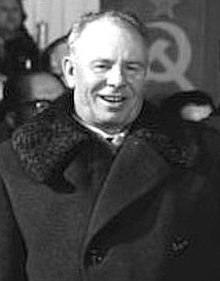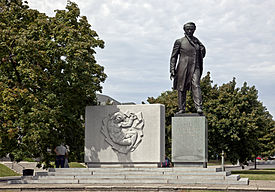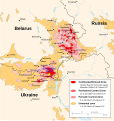Portal:Ukraine
The Ukraine Portal - Портал України
Ukraine Україна (Ukrainian) | |
|---|---|
| ISO 3166 code | UA |
Ukraine is a country in Eastern Europe. It is the second-largest European country after Russia, which borders it to the east and northeast. It also borders Belarus to the north; Poland and Slovakia to the west; Hungary, Romania and Moldova to the southwest; with a coastline along the Black Sea and the Sea of Azov to the south and southeast. Kyiv is the nation's capital and largest city, followed by Kharkiv, Dnipro, and Odesa. Ukraine's official language is Ukrainian.
During the Middle Ages, Ukraine was the site of early Slavic expansion and the area later became a key centre of East Slavic culture under the state of Kievan Rus', which emerged in the 9th century. The state eventually disintegrated into rival regional powers and was destroyed by the Mongol invasions of the 13th century. The area was then contested, divided, and ruled by a variety of external powers for the next 600 years, including the Polish–Lithuanian Commonwealth, the Austrian Empire, the Ottoman Empire, and the Tsardom of Russia. The Cossack Hetmanate emerged in central Ukraine in the 17th century, but was partitioned between Russia and Poland, and absorbed by the Russian Empire. Ukrainian nationalism developed and, following the Russian Revolution in 1917, the short-lived Ukrainian People's Republic was formed. The Bolsheviks consolidated control over much of the former empire and established the Ukrainian Soviet Socialist Republic, which became a constituent republic of the Soviet Union when it was formed in 1922. In the early 1930s, millions of Ukrainians died in the Holodomor, a human-made famine. The German occupation during World War II in Ukraine was devastating, with 7 million Ukrainian civilians killed, including most Ukrainian Jews.
Ukraine gained independence in 1991 as the Soviet Union dissolved, and declared itself neutral. A new constitution was adopted in 1996. A series of mass demonstrations, known as the Euromaidan, led to the establishment of a new government in 2014 after a revolution. Russia then unilaterally annexed Ukraine's Crimean Peninsula, and pro-Russian unrest culminated in a war in the Donbas between Russian-backed separatists and government forces in eastern Ukraine. Russia launched a full-scale invasion of Ukraine in 2022. Since the outbreak of war with Russia, Ukraine has continued to seek closer ties with the United States, European Union, and NATO.
Ukraine is a unitary state and its system of government is a semi-presidential republic. A developing country, it is the poorest country in Europe by nominal GDP per capita and corruption remains a significant issue. However, due to its extensive fertile land, pre-war Ukraine was one of the largest grain exporters in the world. Ukraine is considered a middle power in global affairs, and the Ukrainian Armed Force is the fifth largest armed force in the world in terms of both active personnel as well as total number of personnel with the eighth largest defence budget in the world. The Ukrainian Armed Forces also operates one of the largest and most diverse drone fleets in the world. It is a founding member of the United Nations, as well as a member of the Council of Europe, the World Trade Organization, and the OSCE. It is in the process of joining the European Union and has applied to join NATO. (Full article...)
In the news
- 19 November 2024 – Russian invasion of Ukraine
- Attacks in Russia during the Russian invasion of Ukraine
- Ukraine launches ATACMS ballistic missiles at targets in Bryansk Oblast, Russia, according to the Russian Defence Ministry. It is the first time that Ukraine has used the American-supplied missiles to strike targets inside Russia. (BBC News)
- Nuclear risk during the Russian invasion of Ukraine, Russia and weapons of mass destruction
- Russian President Vladimir Putin signs a decree that allows his country to use nuclear weapons in response to conventional attacks by a non-nuclear state supported by a nuclear power. (Reuters)
- German Taurus controversy
- German opposition politician Florian Hahn condemns German Chancellor Olaf Scholz's refusal to grant long-range Taurus missiles to the Ukrainian military as putting party interests above foreign policy. ('The Kyiv Independent')
- The United Kingdom and France both organize new military packages containing long-range missiles to send to Ukraine following United States President Joe Biden's decision to allow deep strikes of American weaponry into Russian territory. (Newsweek)
- 18 November 2024 – Russian invasion of Ukraine
- Russian strikes against Ukrainian infrastructure
- Odesa strikes
- Russian forces launch a missile attack on the city of Odesa, Ukraine, for the second consecutive day, killing at least ten civilians, injuring dozens of others and damaging civilian infrastructure, including residential buildings. (Ukrainska Pravda)
Featured pictures
Did you know (auto-generated)

- ... that in 2014 the European Theatre Convention started a programme known as Dialogue of Cultures to support exchanges with theatres in Ukraine and other Eastern European countries?
- ... that after the Russian invasion, the daughter of the Ukrainian ambassador to Indonesia was evacuated together with Indonesian citizens in Ukraine?
- ... that in 2020, Ukrainian association football referee Maryna Striletska was part of the first all-woman officiating team for a men's international football match?
- ... that Olga Onuch is believed to be the first professor of Ukrainian politics in the English-speaking world?
- ... that Halyna Kuzmenko promoted the Ukrainization of the Makhnovist movement, successfully increasing the use of the Ukrainian language by Russian speakers?
- ... that Ukrainian artist Kateryna Antonovych worked at Prague's Museum of Ukraine's Struggle for Independence before the US Army Air Forces bombed it?
More did you know -
- ... that the Kryvbas economic region in Ukraine is one of the largest iron ore and steel industry centers in Europe?
- ... that the Privat Group is one of the few Ukrainian companies that own industries in the United States?
- ... that Ukrainian naturalist, lecturer, artist and author John Lhotsky was credited as the first discoverer of gold in New South Wales?
- ... that the married Western Ukrainian Clergy became a hereditary caste that dominated western Ukrainian society?
- ... that at its first years Kiev Zoo had to move its animals into the food storage of the main Kiev railway station for the winter?
- ... that according to legend, a tunnel leads from the Kamianets-Podilskyi Castle to the Khotyn Fortress which is 20 kilometres (12 mi) away?
Selected article -
Little Russia, also known as Lesser Russia, Malorussia, Little Rus', and the French equivalent Petite Russie, is a geographical and historical term used to describe Ukraine.
At the beginning of the 14th century, the patriarch of Constantinople accepted the distinction between what it called the eparchies of Megalē Rosiia (Great Rus') and Mikrà Rosiia (Little Rus'). The jurisdiction of the latter became the metropolis of Halych in 1303. The specific meaning of the adjectives "Great" and "Little" in this context is unclear. It is possible that terms such as "Little" and "Lesser" at the time simply meant geographically smaller and/or less populous, or having fewer eparchies. Another possibility is that it denoted a relationship similar to that between a homeland and a colony (just as "Magna Graecia" denoted a Greek colony). (Full article...)
In the news
- 19 November 2024 – Russian invasion of Ukraine
- Attacks in Russia during the Russian invasion of Ukraine
- Ukraine launches ATACMS ballistic missiles at targets in Bryansk Oblast, Russia, according to the Russian Defence Ministry. It is the first time that Ukraine has used the American-supplied missiles to strike targets inside Russia. (BBC News)
- Nuclear risk during the Russian invasion of Ukraine, Russia and weapons of mass destruction
- Russian President Vladimir Putin signs a decree that allows his country to use nuclear weapons in response to conventional attacks by a non-nuclear state supported by a nuclear power. (Reuters)
- German Taurus controversy
- German opposition politician Florian Hahn condemns German Chancellor Olaf Scholz's refusal to grant long-range Taurus missiles to the Ukrainian military as putting party interests above foreign policy. ('The Kyiv Independent')
- The United Kingdom and France both organize new military packages containing long-range missiles to send to Ukraine following United States President Joe Biden's decision to allow deep strikes of American weaponry into Russian territory. (Newsweek)
- 18 November 2024 – Russian invasion of Ukraine
- Russian strikes against Ukrainian infrastructure
- Odesa strikes
- Russian forces launch a missile attack on the city of Odesa, Ukraine, for the second consecutive day, killing at least ten civilians, injuring dozens of others and damaging civilian infrastructure, including residential buildings. (Ukrainska Pravda)
Selected anniversaries for November
- November 11—November 12, 1918 — Battle of Przemyśl was fought between Polish and Ukrainian forces.
- November 24, 2007 - the official day of remembrance for people who died as a result of Holodomor and political repression.
Photo gallery
Related portals
Religions in Ukraine
Post Soviet states
Other countries
WikiProjects and collaborations
Associated Wikimedia
The following Wikimedia Foundation sister projects provide more on this subject:
-
Commons
Free media repository -
Wikibooks
Free textbooks and manuals -
Wikidata
Free knowledge base -
Wikinews
Free-content news -
Wikiquote
Collection of quotations -
Wikisource
Free-content library -
Wikiversity
Free learning tools -
Wikivoyage
Free travel guide -
Wiktionary
Dictionary and thesaurus
New articles
Ukrainian editions of Wikimedia projects
Notes
- ^ In this name that follows Eastern Slavic naming customs, the patronymic is Ilyich and the family name is Brezhnev.



































































